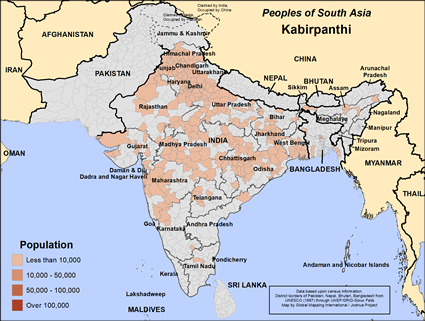Kabirpanthi in India

Photo Source:
Anonymous
|

Map Source:
People Group data: Omid. Map geography: UNESCO / GMI. Map Design: Joshua Project
|
| People Name: | Kabirpanthi |
| Country: | India |
| 10/40 Window: | Yes |
| Population: | 82,000 |
| World Population: | 82,000 |
| Primary Language: | Punjabi, Eastern |
| Primary Religion: | Other / Small |
| Christian Adherents: | 0.00 % |
| Evangelicals: | 0.00 % |
| Scripture: | Complete Bible |
| Ministry Resources: | Yes |
| Jesus Film: | Yes |
| Audio Recordings: | Yes |
| People Cluster: | South Asia Sikh - other |
| Affinity Bloc: | South Asian Peoples |
| Progress Level: |
|
Introduction / History
The Kabirpanthi means "the path of Kabir", a guru who lived in the 15th century in north India. Kabir's oral teachings were written down after his death. Kabir wanted to find a unity between Hinduism and Islam. He was born into a clan of Muslim Sufi weavers. Kabir did not want Hindus to leave their religion but taught that they should not worship idols. He criticized the caste system and believed that all people were equal. Most Kabirpanthi have a low level of literacy, which hinders their economic advance in Indian society.
Most speak Eastern Punjab and Hindi. The Kabirpanthi live all over India.
What Are Their Lives Like?
Modern factories make cloth more efficiently and cheaply than the traditional handlooms of the Kabirpanthi. As a result many of them have found other work as skilled and unskilled laborers. Some have opened shops while others work in construction and forestry. Some work as landless farm workers. The Kabirpanthi are the fourth worker caste of Hinduism. They are eligible for reserved public jobs and special university admissions. Some Kabirpanthi have become educated and work as professionals and businesspersons in cities.
The Kabirpanthi marry within their clans. The bride's family pay a dowry to the groom's family to help set up the household of the new family. Families arrange marriages with the newly married couple living with or near the groom's parents. Sons inherit property with the eldest son becoming head of the family after his father's death.
What Are Their Beliefs?
Sikhism originated from a 15th century teacher named Guru Nanak Dev as a reform movement. He rejected the Hindu caste system, taught that all people were equal and that all have equal access to God. The Sikh God is formless, without gender and is to be found in everyone. One gets closer to God by living a good life and by practicing charity. Like Hindus, Sikhs believe in reincarnation and the law of karma; you reap what you sow in your previous life. Like Muslims, the Sikhs worship only one God.
One may recognize a Sikh man by his distinctive turban. All the 10 great Sikh gurus wore turbans. Sikh teaching mandates that a person not cut his or her hair. They worship their holy book, the Granth Sahib, which is a collection of hymns.
There are roughly the same number of Sikhs as there are Jews in the world, but Sikhs are most concentrated in Punjab, their homeland. However, you will find smaller numbers of Sikhs all over the world.
What Are Their Needs?
The Kabirpanthi need help in educating their children beyond the primary level. Most Kabirpanthi have access to modern medicine and electricity in their villages. The Kabirpanthi need help in learning new job skills. Most of all, the Kabirpanthi need to hear and understand the message of Jesus Christ. He alone can forgive their sins and get them right with the one, true God.
Prayer Points
Pray for a movement to Jesus to multiply among Kabirpanthi households.
Pray that God will overthrow spiritual forces of darkness opposing the spread of his gospel among the Kabirpanthi.
Pray that many of the Kabirpanthi people will come to love the true God with their whole being and will walk in his ways.